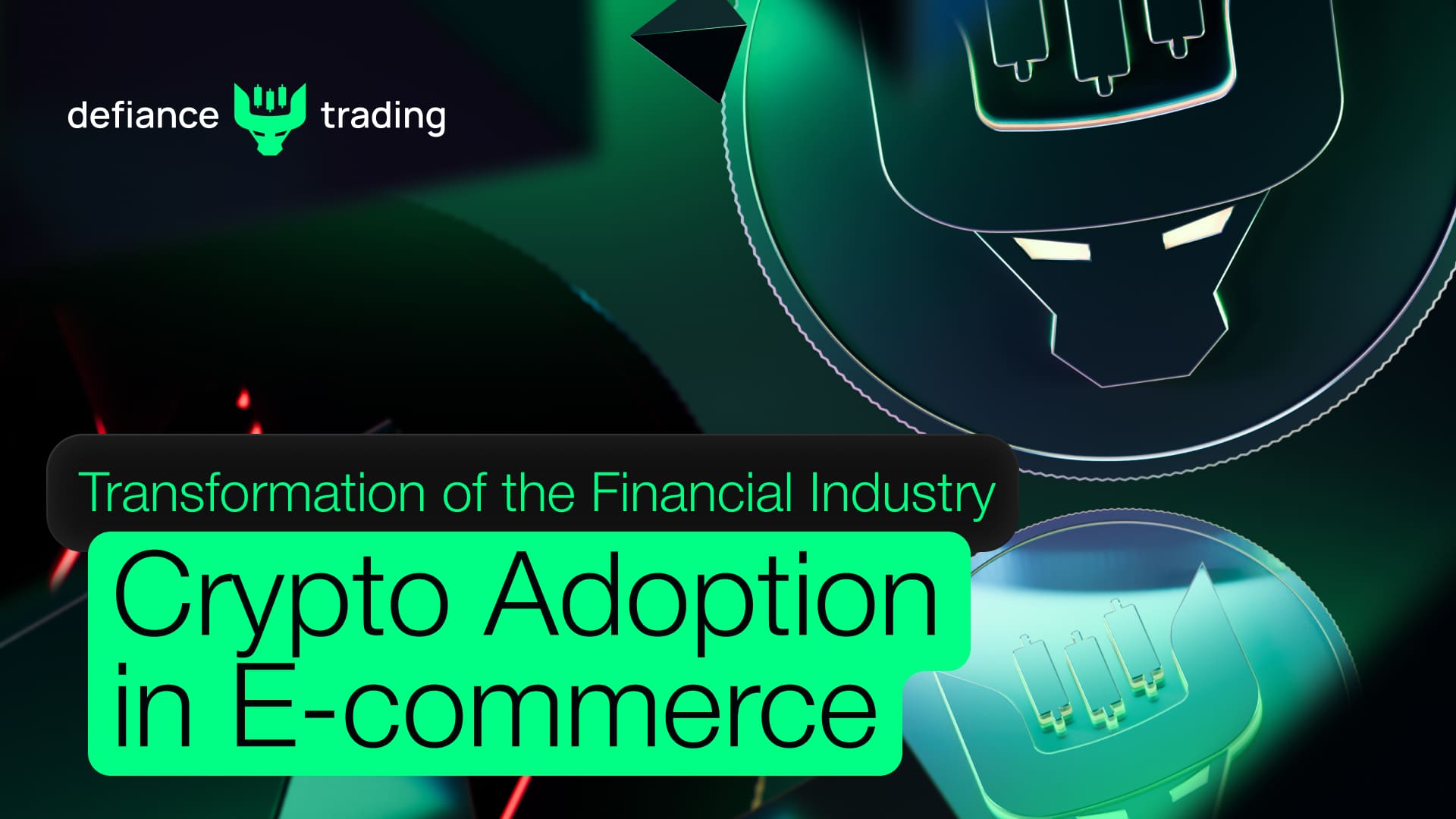Transformation of the Financial Industry: Crypto Adoption in E-commerce

Imagine you want a leather jacket, but you need to find someone who has it and is willing to exchange it for your cherished denim pants. That is what trading used to look like. How we shop and pay has evolved from barter exchange to banking and wire transfers. This period brought avenues like Western Union, SWIFT, and Electronic Funds Transfer (EFT). Wire transfers for cash pickups are still in fashion and quicken the exchange of goods and services. However, this method suffers from security, time, and cost constraints.
Later, mobile money transfers came around. As the internet rose in the 2000s, businesses moved online, and people received money comfortably. After that, we started to see the banking industry transform, and gradually came crypto adoption in e-commerce. Afterwards, the industry changed from what it used to be to what it is now.
Blockchain technology ensures crypto transactions are tamper-proof and helps businesses avoid fraud. Transactions reach completion in minutes, unlike wire transfers that take business days. Remember, crypto never goes on break. Finally, transaction and time costs are almost nothing without intermediaries.
In this article, we will explore how crypto adoption in e-commerce is transforming the industry, the challenges this innovation faces, companies already using crypto for payments, and what to expect in the future.
Let’s get right into it!
Benefits of crypto adoption in e-commerce
Cryptocurrency has an advanced technology that is behind its operations. This advanced tech behind cryptocurrency has really changed how transactions are carried out online for daily purchases or even in business settings.. The benefits of crypto adoption in e-commerce are numerous, here are some of the advantages:
One more payment option
Introducing cryptocurrencies into the retail business attracts more traffic to online stores. This is because consumers now have more freedom to buy as much as they want, and pay for purchases in huge sums without having to go through tedious banking processes. Many use this route to evade credit card complexities like one-time pin (OTP) generation and approved card type.
Speedy transactions
Another benefit of crypto adoption in e-commerce is near-instant completion of transactions. Long processing times frustrate potential buyers, and this delay is typical with conventional banking. Time, they say is money in business, as such, traders value transfer speed to save time. Instant cash flow is a good incentive for business growth and quality customer service.
Security of funds
Thanks to an underlying blockchain, each transaction is verified before approval. It takes a terrible amount of work to break a blockchain, and every wallet is secure with private keys that only the owner knows.
Since transactions are made public on the ledger, it is easy to spot fraudulent payments and track them down.
Faster International Transactions
Cryptocurrency technology makes international transactions easier and more cost-effective. In transferring money, payments attract more charges as they move through more hands. However, crypto prevents ever-increasing cross-border charges and exchange rates. A simple transaction from one wallet to another eliminates all mediators.
Low transaction costs
Credit card companies charge up to 3% on a single transaction. Imagine how much a business has to spend to buy from 5 manufacturers abroad. However, cryptocurrency transactions cost much less. Sometimes, the cost implication is even negligible. When accumulated, cheap charges can do wonders for a company’s exports and multiply profits by a hundredfold.
Challenges facing crypto adoption in e-commerce
Despite the many benefits of crypto adoption in e-commerce, it does not come without its challenges. Some of these challenges includes:
Cyber attacks
Although blockchain technology creates top security for cryptocurrencies, more efforts must go into improving the existing protocols to handle cyberattacks. Unfortunately, digital assets, cryptocurrencies remain eye candy for cyber hackers. Take, for instance, the recent attack on Bybit, where the centralized exchange lost around 1.5 billion dollars worth of Ethereum.
Price volatility
Another issue with crypto in e-commerce is the volatility in the prices of crypto assets. For instance, a product priced at an equivalent of 100 dollars can jump to 120 dollars or fall to 50 dollars in minutes. These swings can discourage buyers and affect how sellers do business. There is a need for stability as most buyers earn in fiat currencies.
Shaky regulatory framework
The regulatory landscape for cryptocurrencies is still developing. However, there are more positives now as influential countries like the U.S. are working on legislation that defines digital assets. So far, uncertainty has run businesses operating in varying legal regions into troubled waters.
A new concept for many
Although the knowledge about crypto has increased in recent years, many consumers still find the idea very tricky. You can understand the fear of a trader who intends to invest millions of dollars but knows he cannot question anyone if anything happens. Businesses should invest in education about the effective use of cryptocurrencies.
Use cases of crypto adoption in e-commerce
Worldwide, big corporations are taking a bet on cryptocurrency to ease how consumers interact with their products. Some of these companies are:
- Newegg: Newegg is renowned for retailing gaming components, software packages, and mobile devices. It is the one-stop shop for anything with a chip online. With Newegg customers can pay with crypto for all products. At checkout, users only need to input their wallet address. In addition, a wide range of currencies is accepted.
- Overstock: A furniture and interior decor company makes the list! In 2014, Overstock started accepting crypto payments on their website. Buyers can pay with Bitcoin, Ethereum, Ripple, and others.
- ExpressVPN: it is a top choice among individuals looking for secure virtual networks. Since 2014, ExpressVPN began accepting crypto payments such as USDC from users for various subscription plans on their website.
- Twitch: Twitch is an online streaming platform that is popular among gamers. Founded in 2011, Twitch was sold to Amazon in 2014. Around this time, it led the way in accepting cryptocurrency payments. Today, after a brief suspension in 2019, Twitch allows users to pay for services with tokens like Ethereum and Dogecoin.
Future expectations of crypto adoption in e-commerce
The exchange of goods and services is second to human nature, so the future will only get better when cryptocurrency intersects with e-commerce. Some advances you can expect in years to come include;
Eco-friendliness
When crypto becomes a mainstay, stakeholders will have guidelines that secure a global green future. Today, emissions from cryptocurrency mining cause huge concerns. With the advent of Proof of Stake (PoS) and other consensus mechanisms, the focus is on eco-friendly alternatives like renewable energy sources while preserving the essence of blockchain.
Regulatory clarity
A question remains: Is crypto a commodity or a security? This controversy is one the U.S. SEC intends to settle this tenure. In addition, other developed economies like Japan and China are also working on their stance on crypto about e-commerce. With regulatory clarity, businesses can confidently adopt cryptocurrencies for payments and investments.
Growing adoption
As more consumers show interest in cryptocurrencies, businesses will integrate them into their payment systems. This will empower them to provide payment solutions that enhance the exchange of goods and services. Companies can rub shoulders with their competitors and appeal to tech enthusiasts to achieve this better.
Improved infrastructure to transact with crypto
We can taste the future now as cryptocurrencies have found Artificial Intelligence, Wireless Networks, and Supply chains. These intersections will give rise to fresh opportunities for innovation and make retailing a more efficient venture.
Also, as more businesses become familiar with cryptocurrency, they will create seamless interfaces and instant payment processing to improve user experience and translate into increased adoption.
Conclusion
Cryptocurrencies are gaining ground throughout the e-commerce sector. They enable cheaper, faster, and more secure payments. Although there are concerns about price volatility and regulation, stablecoins help everyone get value for their money.
As more people learn about cryptocurrencies, advanced innovations will emerge in different spheres of the financial market. Soon, crypto-based online retail stores will become the order of the day and operate in a manner that builds trust.
Beyond global financial freedom, crypto opens new doors for business owners to meet customer needs at lower costs.
Visit our WEBSITE regularly for more updates and developments!
Ready to Defy the Odds?
Become part of a growing movement
